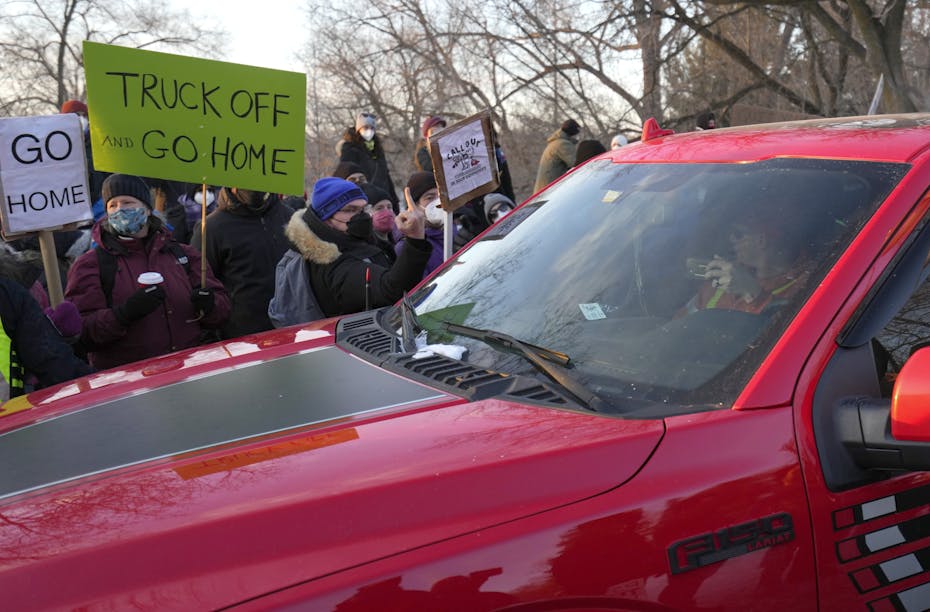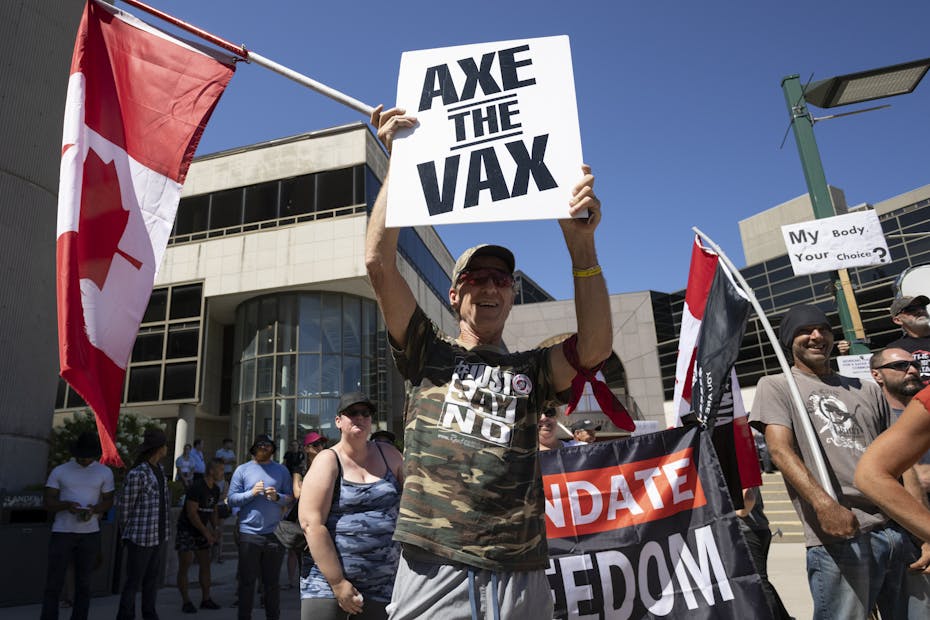A little over a year ago, thousands of people descended on Ottawa protesting COVID-19 pandemic countermeasures as part of a “freedom convoy.”
They contested the science around vaccines, chanted and held signs condemning the Trudeau government. A key theme of the protest movement was anger directed toward the government, scientists and even ordinary people following public health recommendations.
During periods of social, political and economic crisis, blame functions as a particularly powerful emotion. It helps people and groups make sense of uncertainty, place fault or, in some cases, provide help.
Blame also plays a role in colouring public trust in government. It can drive expectations around policymaking and political responsiveness.
Throughout the pandemic, blame loomed large in press reports and public conversations, culminating in the convoy’s head-to-head with Ottawa’s politicians and police.
Pandemic blame
Even now, as most pandemic-related restrictions have been lifted, the blame game continues to fuel contention. Its most recent iteration involves frustrations about alleged abuse of the Canada Emergency Response Benefit (CERB) prompted by the recent auditor general report.
The report indicates that approximately $27.4 billion of pandemic aid went to ineligible people confirming, for some, that CERB was flagrantly abused and they were right to be skeptical about the program.
The convoy protest entrenched an already stark divide between Canadians who supported pandemic restrictions, public health measures and economic supports, and those who distrusted and challenged them.
In our study based on in-depth interviews with 50 Canadians of different ages and with different disabilities and chronic health conditions conducted in summer and fall of 2020, we found that accusations and blame abounded.
Blame for COVID-19’s spread was, for example, levied against vaccine resistors and people who refused to comply with pandemic-related restrictions. The term “covidiots” was used to set irresponsible or, worse still, willfully reckless Canadians apart from their virtuous counterparts.

THE CANADIAN PRESS/Justin Tang
Even those who sought or received CERB were taken to task by our interviewees. There was a feeling that CERB payments had been distributed haphazardly and often to people with no real need of them.
In short, people were assumed to be “scamming” the system. Young people were treated with a uniquely strong sense of suspicion, accused of relying on CERB instead of “working harder.”
This isn’t altogether surprising. People are trying to make sense of others’ attitudes and behaviours by drawing distinctions around who is to blame and why.
Perceptions of pandemic behaviour and support
Canadians found two main ways to place blame while distinguishing themselves from those they perceived to be morally corrupt.
The first was based on health vulnerabilities. Respondents contrasted the inconsiderate and selfish behaviour of people who do not take precautions with the actions of people with disabilities, the elderly and people with health conditions who needed to take extra precautions.
For example, one of our respondents told us she had “become really judgmental… If I am out in the mask and someone walks by and doesn’t have one, it’s like, you’re giving them the death stare, you know?”
Another told us it was a moral duty to socially distance, wear a mask and stay home when necessary. Those who didn’t were described as reckless.

THE CANADIAN PRESS/Nicole Osborne
The other dimension of blame had to do with who people thought was economically deserving of government supports. Respondents were especially critical of young people and others who they thought just “refused to work” and “took advantage” of “handouts.”
As one of our respondents said, “I’m starting to get upset with the amount of money he’s [Prime Minister Justin Trudeau] starting to throw out now. It’s just getting way out of control … and everybody now is putting out their hands saying, ‘what that one got, I want.’”
Blame informs Canadians’ understanding of the pandemic, and certainly, the blame game has evolved alongside changing restrictions, economic policies, and public safety guidelines.
For many, it’s a strategy for managing crisis. Blame helps us make sense of our surroundings and mitigate frustration. The trucker convoy represented a more visible and dramatic manifestation of frustration, but its roots run deep.
The idea that elite establishments are suspicious, that some people are more privileged than others, that some are undeserving and lazy, that they abuse welfare and don’t take responsibility for their health are not new.
As the convoy protest anniversary slips out of view, it’s important to pay close attention to what’s driving grievances and just how far beyond the pandemic they extend.![]()
Jordan Foster, PhD Candidate, Sociology, University of Toronto; David Pettinicchio, Associate Professor, Sociology, University of Toronto, and Michelle Maroto, Associate Professor of Sociology, University of Alberta
This article is republished from The Conversation under a Creative Commons license. Read the original article.








